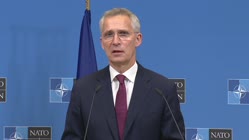NATO Secretary General speech at Keio University, Tokyo 🇯🇵, 01 FEB 2023
Speech by NATO Secretary General Jens Stoltenberg at Keio University, Tokyo, Japan, 1 February 2023.
In his speech at Keio University in Tokyo, Japan, on Wednesday (1 February 2023), Secretary General Jens Stoltenberg stressed that NATO and Japan ''may be oceans apart, but our security is closely connected''.
🗣 | NATO Secretary General:
Thank you, Professor Itoh, Professor Tsuruoka. Good morning to everyone. It is great to be here at Keio University. And to engage with all of you here at Keio University. Japan is an important global actor. Actively promoting peace. And supporting the rules-based international order. This is what NATO stands for too. And for almost 75 years, NATO has ensured peace in the Euro-Atlantic area. Allowing democracy, freedom and prosperity to flourish. But today, the global order that has served us so well for many decades is under threat. Moscow and Beijing are at the forefront of an authoritarian pushback. Russia’s war in Ukraine has shattered peace in Europe. North Korea continues to threaten international security through its reckless missile tests. And other global challenges are rising: From terrorism to climate change, cyber threats and nuclear proliferation.
This is our new security reality. A reality that connects all of us who support peace, freedom and democracy. And a reality that we need to face collectively. Europe and North America together in NATO, working hand-in-hand with our many partners across the globe. Including here, in the Indo-Pacific.
Last June, I was honoured to welcome Prime Minister Kishida to our NATO Summit in Madrid. It was the first time he and leaders from our other Indo-Pacific partners – Australia, New Zealand and South Korea – participated together in a NATO Summit. A testimony to our growing ties.
We may be oceans apart. But our security is closely connected. And we share the same values, interests and concerns. This includes supporting Ukraine.
Almost one year ago, President Putin launched a war of aggression against Ukraine. To take control of the country. And take away people’s freedom.
This war is not just a European crisis. It is a challenge to global security and global stability. In response, NATO, Allies, and our partners around the world, including Japan, have condemned this illegal and unjustifiable war.
And we have been providing Ukraine unprecedented assistance. I want to thank Japan for your substantial support. Yesterday, I visited Iruma Air Base, and saw for myself the Japanese cargo planes transporting life-saving aid to the Ukrainian people.
Our support makes a real difference for the Ukrainians. Helping them not only to survive, but also to push back the Russian invader and liberate their territory. Ukraine needs our continued support. For as long as it takes. Because if Putin wins, the message to Moscow, and Beijing, will be that they can achieve what they want through brute force.
This would make the whole world more dangerous. And us more vulnerable.
At the same time as we support Ukraine, NATO’s main priority is to protect our one billion people, and every inch of Allied territory. To do this, we have been strengthening our military presence, especially in the eastern part of the Alliance. We have more troops on high alert. Ready to move, whenever and wherever needed. Stronger defences are not to provoke a conflict with Russia. But to prevent a conflict. And preserve peace.
Meanwhile, Beijing is watching closely. And learning lessons that may influence its future decisions.
What is happening in Europe today could happen in East Asia tomorrow. China is not NATO’s adversary. But its growing assertiveness and its coercive policies have consequences. For your security in the Indo-Pacific. And ours in the Euro-Atlantic.
We must work together to address them.
Beijing is substantially building up its military forces, including nuclear weapons, without any transparency. It is attempting to assert control over the South China Sea, and threatening Taiwan.
Trying to take control of critical infrastructure, including in NATO countries. Repressing its own citizens through advanced technology. And spreading Russian disinformation about NATO and the war in Ukraine.
Transcript continues: https://www.nato.int/cps/en/natohq/opinions_211398.htm




















